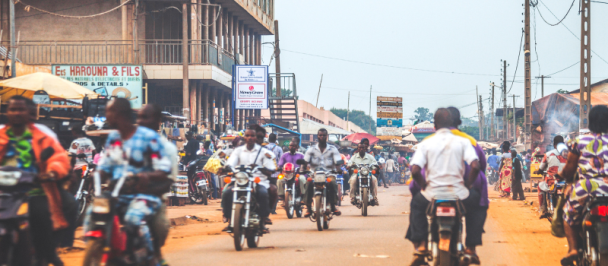The regional stabilization project for the Lake Chad Basin is training women in raising awareness about violent extremism and radicalization. @UNDP Chad / Aurelia Rusek
Addis Abeba, Ethiopia - UNDP and the Institute for Economics and Peace (IEP) organized a virtual event today to launch a report on the economic costs of violent extremism in Africa.
The report, titled “Measuring the Economic Impact of Violent Extremism Leading to Terrorism in Africa”, estimates that 16 of the 18 focus countries - Nigeria, Tanzania, Central African Republic, Niger, Uganda, Kenya, Ethiopia, Senegal, Mali, Burkina Faso, Chad, Cameroon, Tunisia, Morocco, Mauritania and Libya - have lost an average $97 billion per year in informal economic activity since 2007. Using primary research, the regional study examines the impact of attacks on infrastructure and physical damage, formal and informal economies as well as the impact of 'security spending' on development processes. The report was produced by UNDP in collaboration with IEP and support from the Government and people of Japan.
The panel featured four speakers: Mallam Bashir Ahmad, Secretary to the Government, Adamawa State, Nigeria; Andrea Abel, Researcher, IEP; David Hammond, Research Director, IEP; Ojijo Odhiambo, Regional Economic Advisor, UNDP; and Nirina Kiplagat, Preventing Violent Extremism (PVE) Project Manager, UNDP.
The global economic impact of terrorism between 2007 and 2018 was approximately $135 billion, increasing by 1700% since 2007. This figure is in fact a conservative estimate, with many costs unaccounted for and spill over effects that are challenging to capture in dollar terms. Violent extremism causes both direct costs (costs of deaths and injuries) and indirect costs (lost productivity and earnings). Key findings from the study revealed that behavioural changes created fear and reduced risk taking, increased informalization of the economy forced cross-border trade to go underground, and business costs changing in response to investing in security and rebuilding after loss of public infrastructure.
Providing a first-hand perspective from Adamawa State in Nigeria’s north-east, Mr. Bashiru recounted that environments affected by violent extremism need rebuilding in all aspects, from schools and hospitals to roads and secure infrastructures. While governments are often not in a position to fund the kickstarting of the informal sector, they can provide support in the form of grants and investments in social protection measures.
One key finding is how violent extremism affects women in the informal economy, shared Ms. Abel. Since young men are more likely to be recruited or forcefully taken by extremists, the burden on women becomes greater in terms of providing a livelihood and caring for their families. When compounded by the effects of COVID-19, there is a double impact for women who are required to take on even greater responsibilities. Therefore, support for women’s organizations is essential to enable women to meet these increased social and economic needs.
The current context of COVID-19 calls for technological and innovative approaches to solving violent extremism, suggested Mr. Ojiambo. Improved physical and virtual connectivity will enhance cross-border trade and help stabilize markets and food security. In addition, the power of data and analysis can be better harnessed to inform decision making.
Comprehensive data on the root causes of extremism will also reveal the most affected populations and guarantee that investments are targeted towards the right people. Further, countries should rebuild better, more efficiently and more sustainably by integrating these principles into their policymaking and programming.
In her remarks, Ms. Kiplagat stated that the report strengthens the case for a development approach to addressing violent extremism with a strong focus on prevention. Investing heavily in security response measures diverts funding from key sectors such as health and education. Previous evidence-based research, specifically from the Journey to Extremism, revealed that employment status and education levels had an impact on how vulnerable people were to recruitment by extremism groups. Fully mainstreaming prevention in regular development planning and implementation will address underlying grievances and feelings of marginalization, both real and perceived.
Findings from the report aim to equip key stakeholders and policymakers to make evidence-based decisions and choices to address violent extremism from a sustainable development and inclusive livelihood support perspective.
Read the report here.
For more information, contact: Nirina Kiplagat, Regional PVE Project Manager, nirina.kiplagat@undp.org; Tomas Kral, PVE Programme Assistant, tomas.kral@undp.org.

 Locations
Locations


